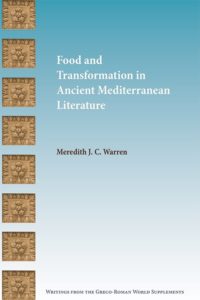My new book, Food and Transformation in Ancient Mediterranean Literature, is now available to order from Society of Biblical Literature Press or on Amazon. There’s a limited preview available on Google Books, too.

This book is the culmination of over six years of research and covers a range of texts between the second century BCE and third century CE. In my discussion of these texts, I identify and define a new genre in ancient texts that I call hierophagy, a specific type of transformational eating where otherworldly things are consumed. Multiple ancient Mediterranean, Jewish, and Christian texts represent the ramifications of consuming otherworldly food, ramifications that were understood across religious boundaries. Reading ancient texts through the lens of hierophagy helps scholars and students interpret difficult passages in Joseph and Aseneth, 4 Ezra, Revelation 10, and the Persephone myths, among others.
You can read the Introduction and take a look at the table of contents by visiting my Publications page.
You can watch a short overview of my earlier research on this topic, and watch a longer, more detailed discussion of hierophagy in the Passion of Perpetua and Felicitas. Both videos are available on my Videos & Interviews page.
Critical Praise for Food and Transformation in Ancient Mediterranean Literature:
This groundbreaking analysis of hierophagy in ancient literature explores the distinct literary function of eating otherworldly food, while also putting these transformative acts in their social and cultural contexts. The author moves deftly from the texts of Ovid and Apuleius to apocalyptic Jewish literature and tales of Christian martyrdom, breaking down traditional barriers in the study of ancient literature. This volume will be essential reading for scholars of antiquity and adds much to our understanding of the representation of consumption and taste in the ancient Mediterranean.
–K. C. Rudolph, Lecturer in Classics & Philosophy, Department of Classical & Archaeological Studies, University of Kent
In this brilliant, ground-breaking, and theoretically informed work, Meredith Warren opens up a new area of scholarship. Her careful readings of ancient Jewish and Christian texts deftly demonstrate the importance of the transformative effects of eating both for the authors of ancient texts and for anyone thinking about food practices today.
–Candida Moss, Cadbury Professor of Theology, School of Philosophy, Theology & Religion, University of Birmingham
